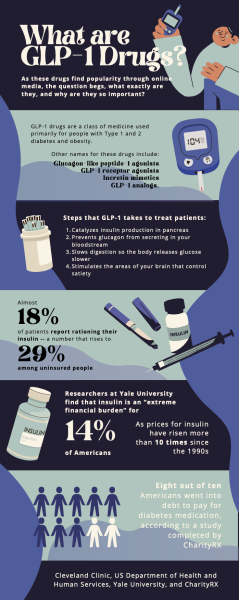Media stars may have access to weight-loss drugs typically prescribed for patients with diabetes – such as Ozempic and Wegovy – but soon, North Carolina state employees won’t under their insurance coverage, due to a policy that enacts on April 1.
The board of the North Carolina State Health Plan voted 4-3 on Jan. 22, 2024, to end coverage of weight loss medications like Wegovy for weight loss purposes among state workers, despite research indicating that doing so would mean many patients will gain the weight they lose from previous medication use.

The end of the program’s coverage comes in light of disputes with manufacturer Novo Norsick. When the state attempted to stop serving new patients in recent years, Novo Nordisk stopped providing rebates to the state, increasing drug costs by $54 million. Unless the board reaches a compromise, insurance holders will lose access to these drugs.
“It defies logic that Novo Nordisk can sell the exact same product in the Netherlands for $296 per month and in the United States for more than $800 per month,” said State Treasurer Dale Folwell. “They should be investigated by the Federal Trade Commission for unfair and deceptive business practices.”
The State Health Plan spends $100 million on medications serving 480,000 people annually. Experts estimate that the state government will lose $1.5 billion by 2030 if the plan continues to pay at the current rate. Disputes with drug manufacturers led state officials to axe coverage of popular and expensive weight loss drugs known as GLP-1 medications. Certain drugs – like Wegovy, Saxenda and Ozempic – mimic hormones that direct the body to create more insulin when a patient’s blood sugar rises too high.
“We remain concerned about the negative financial impact on premiums paid by members of the Plan for GLP-1s used for weight loss,” said Folwell, in a statement in Nov. 2023. “We are hopeful that a new competitor in the marketplace will provide for competition and create downward pressure on prices. So far as Novo Nordisk’s products are concerned, we want to pay the same price for these drugs that people in their home country of Denmark pay.
The new policy makes it difficult for state employees to access weight loss medications they already use, as market prices for drugs can reach the thousands. However, expensive drug costs are driven by increasing demand from fast weight loss trends popularized by social media, which implicates non-state employees too.
Clara Nelson, a North Carolina resident of six years whose name has been changed to preserve anonymity, explained that patients in need of GLP-1 drugs for their medical services must compete with users desiring solely weight loss. “It’s understandable why they need to cut these funds, but it’s very scary,” said a North Carolina of six years. “My mother has Type 1 diabetes, and I am prediabetic, so accessing these drugs is critical to my family.”
Although such treatments are typically geared toward patients with Type 1 and 2 diabetes, GLP-1 drugs can act as a proxy for weight loss and are popularized by celebrities and media figures accused of seeking ways to lose weight rapidly. However, using these drugs regularly is not without risk. In an investigation by Mayo Clinic researchers, they surveyed and tested patients, nearly half of whom experienced negative side effects of the drug.
“It’s hard to see these drugs become so popular and used by people everywhere to lose weight when you and your loved ones really need them to control high blood sugar. We don’t take this because we want to; we have to. If we don’t get our medicine on time, we risk a lot of dangerous effects,” Nelson said.
Both diabetes patients and the healthcare industry pay for the cost of diabetes medicine. It cost the country $412.9 billion in 2022, and for 14% of Americans, 40% of their annual income. As North Carolina struggles to meet this need from state employees, Folwell calls for manufacturers to work with state legislators to create a deal that both parties can agree on.
He concluded his statement affirming the need for cooperation between the two. “We are not questioning the efficacy of the drugs, but we simply can’t afford these medications at the manufacturer’s current price point,” said Folwell, in a previous statement in Oct. 2023. “It’s price gouging. We just want to pay the same price that Novo Nordisk charges its customers in their home region.”
If an agreement is not reached, state workers will be required to pay the full price for GLP-1 medications from April 1 and onwards.





















































































